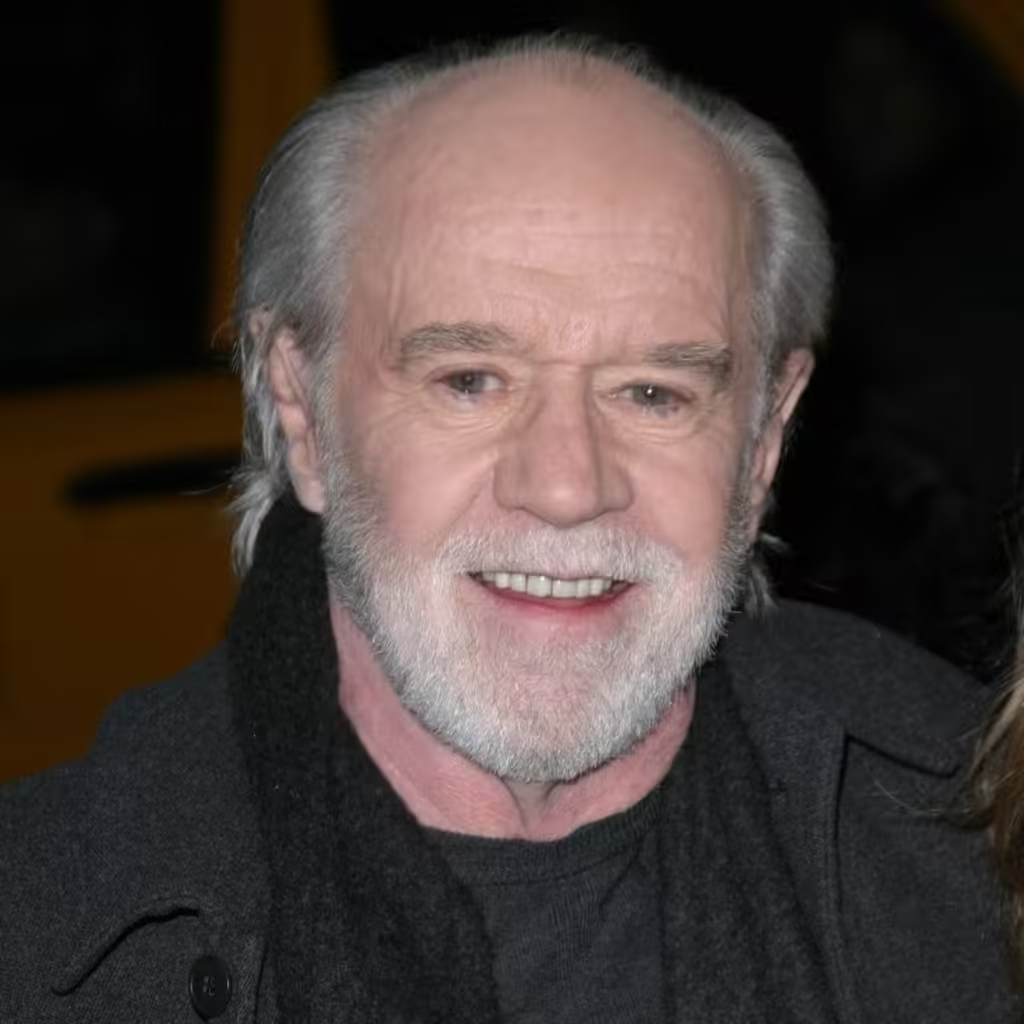
Table of Contents
Who Was George Carlin?
George Carlin was a groundbreaking comedian, author, and actor known for his sharp wit and provocative commentary on society. His career spanned five decades, during which he pushed the boundaries of comedy by tackling taboo subjects like religion, politics, and free speech. After a nontraditional start—including dropping out of high school and serving in the U.S. Air Force—Carlin eventually became one of the most influential voices in stand-up comedy, leaving a lasting legacy in entertainment and social commentary.
Early Life
Born on May 12, 1937, in the Bronx, New York, George Denis Patrick Carlin grew up in Manhattan’s Morningside Heights neighborhood. Raised primarily by his mother, Mary Carlin, after she left his father, Carlin had a tumultuous relationship with his strict Irish Catholic upbringing. His early negative experiences with religion, particularly as a Roman Catholic altar boy, greatly influenced his later views and comedic material.
Carlin attended parochial school but dropped out in the ninth grade. At age 17, in 1954, he enlisted in the U.S. Air Force and worked as a radar technician stationed in Louisiana. While in the military, he completed his high school education and worked part-time as a disc jockey, which sparked his interest in broadcasting. Despite a series of disciplinary issues, he received a general discharge in 1957 and pursued a career in radio.
Early Comedy Career
In 1959, Carlin teamed up with newscaster Jack Burns, and together they hosted a morning radio show in Fort Worth, Texas. The duo’s chemistry attracted attention, leading them to Hollywood, where they caught the eye of renowned comedian Lenny Bruce. With Bruce’s help, Burns and Carlin made appearances on “The Tonight Show with Jack Paar,” which boosted their profile. After the duo parted ways, Carlin continued to gain exposure, particularly with his numerous appearances on “The Tonight Show with Johnny Carson” and “The Merv Griffin Show.”
By the early 1960s, Carlin was performing stand-up in Las Vegas and on television, but it wasn’t until the mid-1970s that he found his true comedic voice. Shedding his earlier, more conventional image, Carlin embraced a more rebellious, countercultural style, using humor to challenge societal norms. His performances addressed controversial topics such as the Vietnam War, drugs, religion, and civil liberties, often leading to debates about free speech and censorship.
This bold transformation solidified Carlin’s reputation as a fearless social critic, making him a pioneering figure in modern comedy.
Seven Words Routine and Legal Controversy
In July 1972, comedian George Carlin was arrested in Milwaukee for violating obscenity laws after performing his controversial “Seven Words You Can Never Say on Television” routine. The routine would later ignite a legal battle over obscenity regulations when a radio station aired a recording of it. This case culminated in a 1978 U.S. Supreme Court ruling that upheld the government’s right to penalize broadcasters who aired such material during hours (6 a.m. to 10 p.m.) when children might be listening.
Despite facing criticism for his irreverence and open discussions of topics like atheism and drug use, Carlin found success, particularly with the younger counterculture. His anti-establishment views were further highlighted when he became the first host of the groundbreaking TV show Saturday Night Live on October 11, 1975.
Career Milestones and Comedy Legacy
Carlin’s career took off in the late 1970s with his first HBO comedy special, On Location: George Carlin at USC in 1977. He would go on to do 14 such specials, including It’s Bad For Ya! in 2008. These specials became iconic for their sharp social commentary and humor.
In 1990, Carlin released a multi-CD set titled George Carlin: The Little David Years (1971-1977), featuring his early works such as FM & AM, Class Clown, and Toledo Window Box. His comedy albums earned him two Grammy Awards, including one for FM & AM (1990) and another for Jammin’ in New York (1992). His 1999 special, You Are All Diseased, exemplified his biting satire on American society.
In 1997, Carlin published Brain Droppings, a best-selling book that showcased his unique comedic take on life and politics. The book remained on the New York Times bestseller list for 18 weeks, and a plagiarism scandal involving the book brought even more attention to his work.
Carlin also enjoyed success in film, with notable roles in movies like Outrageous Fortune (1987), Bill & Ted’s Bogus Journey (1990), and The Prince of Tides (1991). In 1999, he played Cardinal Glick in Kevin Smith’s film Dogma. He lent his voice to the character Fillmore, a hippie Volkswagen bus, in the animated film Cars (2006).
Later Years and Lasting Impact
Carlin’s influence extended beyond stand-up comedy into television and voice acting. He voiced the train conductor on PBS’ Shining Time Station and narrated Thomas the Tank Engine & Friends from 1991 to 1998. He also starred in his own series, The George Carlin Show, from 1993 to 1995.
Throughout his career, Carlin remained active, performing around 150 live shows a year. He was recognized as one of the greatest comedians of all time, placing second behind Richard Pryor on Comedy Central’s list of “Top 100 Comics of All Time” in 2004. Just days before his death, it was announced that Carlin would receive the 11th annual Mark Twain Prize for American Humor.
Carlin passed away on June 22, 2008, but his legacy lives on. He is survived by his daughter, Kelly, from his 35-year marriage to his first wife, Brenda Hosbrook, who passed away in 1997, and by his second wife, Sally Wade. His contributions to comedy, his sharp social critiques, and his fearless approach to controversial topics continue to influence the world of stand-up and beyond.
